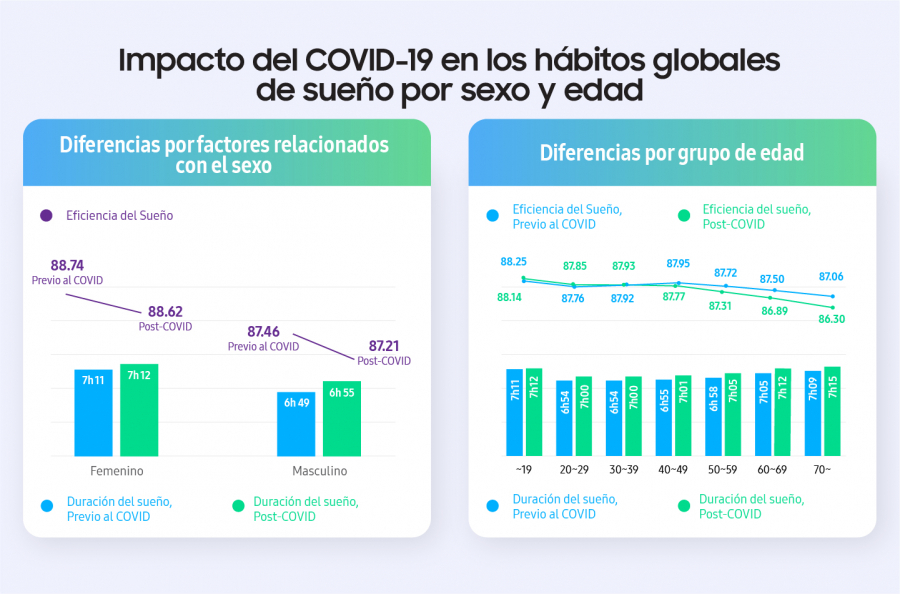A large part of this has involved gaining greater awareness of the health benefits of sleep.
Sleep is a reboot for the mind and body, is what strengthens both physical and cognitive health, and helps people better perform tasks that require long periods of concentration. Getting a good night's rest can, for example, help people work more productively, drive more safely, and think more clearly.
Given the impact the pandemic had on our daily habits, it is worth exploring how our sleep may have changed as a result.
Let's take a closer look at how sleep duration and efficiency became different around the world since the beginning of the pandemic through the standards of global Samsung Health users.
Sleep duration versus efficiency: why it matters
When it comes to sleep, longer duration does not necessarily mean better quality. For the purposes of this analysis, duration refers to the amount of time in bed trying to sleep, while sleep efficiency measures the percentage of time in bed that we actually spend sleeping.
While changes in lifestyle habits during the pandemic have made people sleep longer worldwide, there does not appear to be a correlation between sleep duration and sleep efficiency.
In fact, although people in all countries enjoy longer sleep times on average than before the pandemic, we actually experience an overall decline in sleep efficiency.
Moreover, the results vary by sex. While both men and women are more rested now than before the pandemic, men have not only seen a longer increase in sleep duration, but also a decrease in sleep efficiency compared to women.
Age is another factor that provides interesting insights. While all age groups have slept longer, sleep efficiency has actually decreased with increasing age. The exception here is people aged 20-39, who have actually experienced a jump in sleep efficiency. Moreover, this age group was the only one that has shown a significant increase in both duration and efficiency.
How the pandemic changed regional sleep habits
We also conducted a deep dive into the 16 countries where people use Samsung Health the most to see how trends in sleep habits vary by region. While all 16 nations have seen an increase in sleep duration, with people, on average, waking up later than they used to, the effect on sleep efficiency has been mixed.
Region-specific changes in overall sleep habits can be seen as follows:
- While sleep duration has continued to be the longest, both pre- and post-pandemic, in France, the efficiency of this habit in the country has declined.
- Users in Korea have recorded one of the largest increases in sleep duration and sleep efficiency during the pandemic, but have still remained below the global average.
- The US has experienced the largest drop in sleep efficiency of all regions measured.
- While Germany has recorded the highest sleep efficiency scores globally prior to the pandemic, it has since witnessed one of the most significant declines in sleep efficiency.
- Argentina has recorded the highest sleep efficiency after the onset of the pandemic.
- While Indonesia was the lowest index region before the pandemic, this new distinction belongs to Vietnam. In addition, of the 16 countries studied, Indonesia has experienced the largest increase in sleep efficiency from pre- to post-COVID-19 levels.
- Indonesia has also experienced a delay in wake-up time of 11 minutes on average after the onset of the pandemic. It was and remains the region that recorded the earliest wake-up times.
- Mexico is the region that has seen the greatest change in wake-up and bedtimes. The average bedtime has changed by 11 minutes and the average wake-up time has been delayed by 17 minutes.
How you can improve the quality of your sleep
Healthy sleep for the average adult is often said to be 8 hours per night 1 . However, as the results show, sleep quality is also an important factor to consider. Tracking this sleep routine is one way we can better understand our sleep standards to ensure we are getting a better night's sleep.
Many Galaxy device users are taking advantage of this, with 50% of Galaxy users
Watch tracking their sleep at least once a week. Of those, 40% do it more than three times a week 2. To better manage your sleep, take a look at these tips for using the Galaxy Watch Series 3 and consider adopting some to ensure that every night's rest is as restful as possible.
- Track your sleep standards: Sleep Score gives you detailed data on when you enter deep sleep, REM sleep and how your sleep and wake times vary.
- Better understand the quality of your sleep: with Blood Oxygen monitoring and Snore Detection, you can learn more about your sleep standards and overall health.
- Try a sleep coaching program: With Sleep Coaching, receive a personalized sleep guidance program based on your actual sleep habits, represented by one of eight dedicated sleep symbol animals, to help you understand and improve the time you devote to this rest routine.
- Establish an ideal sleep environment: Since where you sleep is as important as the characteristics of that physical environment, consider adding automatic settings to the temperature and light controls in your home to ensure that the environment is ideal for rest.
 English
English  Español
Español 
